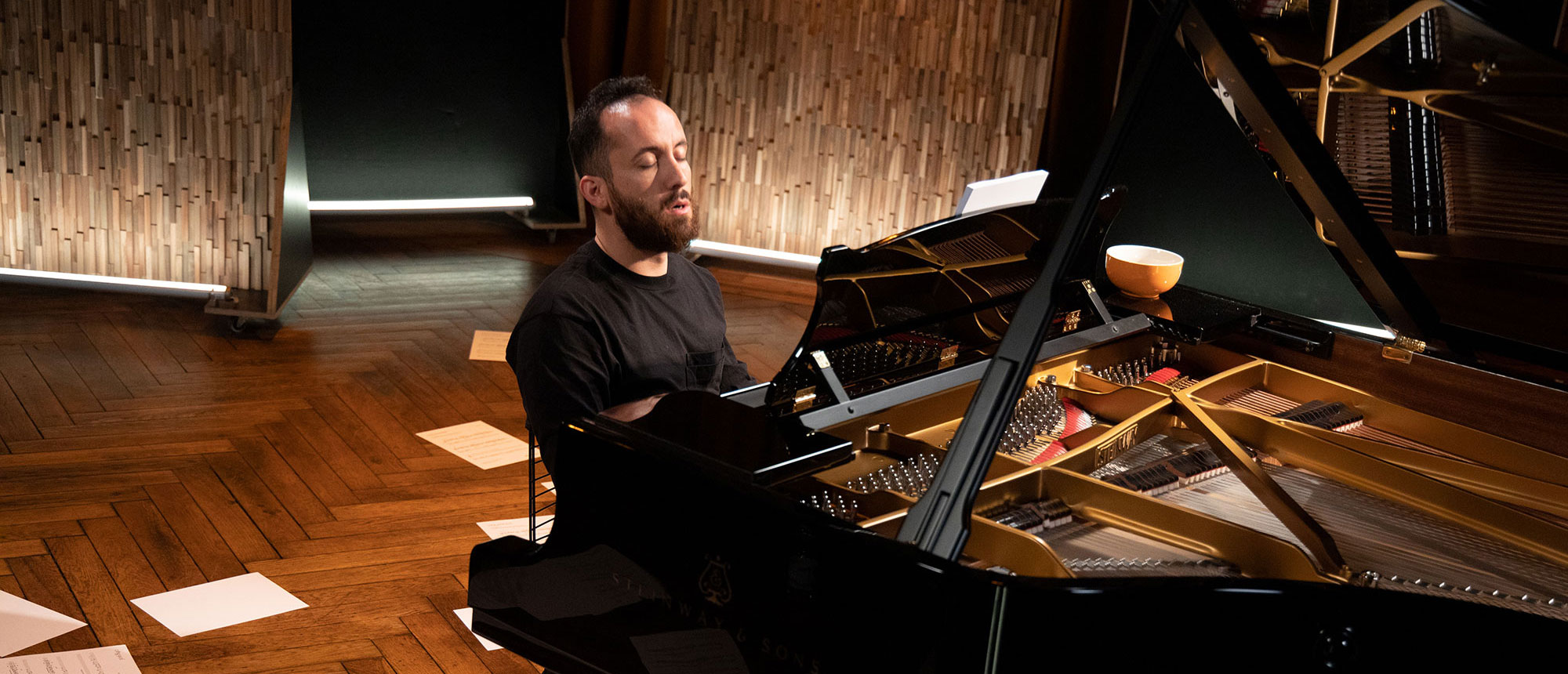About the performance
At the end of May 2020, in the middle of the first lockdown of the Corona pandemic, Igor Levit decided to put into action an unusual, almost spectacular project: The performance of Erik Satie's strange piano piece entitled "Vexations." The work, which consists of only a single sheet of music, is to be repeated - according to the composer's will - 840 times in one piece. Levit decided to share it with the world's digital audience and used a portion of the prize money from the prestigious Gilmore Artist Award to create the performance. "Vexations" is French and means torture.
For the performance, the pianist had the sheet of music printed 840 times on numbered white sheets of paper, laying them down one by one after each repetition to reach the prescribed 840 exactly at the end.
After the performance, the sheets were picked up and given as a thank you to a generous supporter of the music scene during the Corona Crisis. Now in renewed lockdown, he decided to sell the individual sheets for the benefit of charities that support the suffering orchestral music scene. Each sheet is signed by the pianist himself.
Levit before the performance in May 2020:
“It has always been a strong wish of mine to be able to perform Erik Satie’s Vexations. While written in the 19th century, this piece was revolutionary thanks to its atonal harmony. The few notes – a theme and two variations – fit on just one sheet. The 840 repetitions though herald early on a future of aesthetic repetitiveness. The sheer duration of over 20 hours of Vexationsdoesn’t feel like a ‘nuisance’ or ‘torture’ to me, as the title would suggest, but rather a retreat of silence and humility. It reflects a feeling of resistance.
“That’s why it feels right to play the Vexations right now. My world and that of my colleagues has been a different one for many weeks now and will probably remain so for a long time. Vexations represent for me a silent scream.”

Where do the proceeds go?
Half of the total purchase price goes to "FREO - Freie Ensembles und Orchester in Deutschland e.V." and half to the "Nothilfefond der Deutschen Orchesterstiftung", which are briefly introduced here:
FREO e.V.
We are pleased and grateful that the organizers have decided to donate half of the proceeds to FREO e.V.. FREO e.V. is a young non-profit initiative that promotes the interests of free ensembles and orchestras and the independent musicians organized in them. The Covid 19 pandemic is hitting independent ensembles and orchestras particularly hard. The existential hardship is great. Lasting and profound damage, even the loss of numerous free, internationally renowned orchestras has become a bitter and tangible reality.
The free ensembles and orchestras need support - and that is exactly why FREO e.V. exists. We don't let ourselves get down, remain optimistic and help: through consulting, research, knowledge collection and transfer, networking and exchange of experiences and the continuous conversation with the political level.
The funds from this campaign support our commitment to the independent ensembles and orchestras and their musicians. Thank you very much!
FREO e.V. currently has 30 members: Akademie für Alte Musik Berlin, Andromeda Mega Express Orchestra, Auditivvokal Dresden, Bayerische Kammerphilharmonie, Berliner Symphoniker, Concerto Köln, Deutsches Kammerorchester Berlin, Dresdner Sinfoniker, Electronic ID, El Perro Andaluz, ensemble ascolta, Ensemble Aventure, Ensemble Modern, ensemble mosaik, Ensemble Musikfabrik, ensemble recherche, Ensemble Reflektor, Ensemble Resonanz, Freiburger Barockorchester, Kammerakademie Potsdam, Kammerphilharmonie Lübeck, Klangforum Heidelberg, Lautten Compagney Berlin, LUX: NM, Mahler Chamber Orchestra, Neue Vocalsolisten, Orchester im Treppenhaus, Solistenensemble Kaleidoskop, Sonar Quartett, Stegreif. Orchestra.
Nothilfefond der Deutschen Orchesterstiftung
(German Orchestra Foundation Emergency Fund)
The #MusikerNothilfe campaign has been collecting donations to help freelance musicians particularly affected by the effects of the pandemic since March 16, 2020, the beginning of the first Corona Lockdown in Germany. They have lost all public performance opportunities for many months. To date, we have received over 4.1 million euros in donations, enabling us to support more than 3,300 freelance musicians.
But it will take even longer before freelance musicians can stand on their own feet again with events and performances. To give these musicians of all styles a perspective that will help them bridge this difficult period, we are now supporting them in the #MusikerZukunft campaign with work grants of up to 2,000 euros.